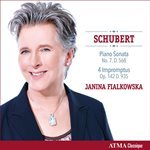|
Back
03/18/2016
Franz Schubert: Sonata N° 7 in E-Flat major, Opus 122 [*] – Four Impromptus, Opus 142 [**]
Janina Fialkowska (Piano)
Recording: Salle Raoul-Jobin, Palais Montcalm, Québec, Canada (September 2012 [**] and October 2014 [*]) – 62’
Atma Classique # ACD 22699 – Booklet in English and French

   
This new recording of Franz Schubert is a must for anyone who loves his piano repertoire. Janina Fialkowska is a veteran performer and recording artist who at age 64 continues to mature and develop. She performed the Sonata N° 7 in E-Flat major, Opus 122 in Ottawa fairly recently (Read here) as part of that summer’s Ottawa International Chamber Music Festival. Her new recording of this somewhat neglected work is a welcome reminder of the composition as well as her live performance. The opening “Allegro moderato” is immediately elegant and delicate, though never excessively so. Fialkowska brings masterful subtlety to the remaining three movements, combining a solid comprehension of each one’s structure as well as the near supernal moods and melodies which unfold. The Sonata N° 7 is not as long or dramatic as some of the composer’s other such works, yet Fialkowska always communicates command and substance. For older listeners, her playing will conjure memories of past Schubert exponents such as Rubinstein, Richter, Serkin and even, during his earlier years, Anton Kuerti.
The Four Impromptus, Opus 142 are, to say the least, extraordinary works, and their title may be misleading. Composed in 1827, they are neither short nor “impromptu.” Structurally, they prefigure Chopin who liked to tinker with sonata and related forms in single movement works such as his Scherzos, Ballades and the later Polonaises - also of which Fialkowska performs - as well as parallel works by Schumann and Brahms.
The Impromptu N° 1 in F minor is essentially in sonata form, and Fialkowska brings breadth to the dramatic opening which echoes Beethoven’s middle period. In the lyrical second subject she brings an angelic sensuality which became increasingly exotic when the composer adds an upper register fioritura to the melody’s repeat, now suggesting late Beethoven.
The Impromptu N° 2 in A-Flat major again is a study in drama and contrasts. Impromptu N° 3 in B-Flat major begins with a discreetly lyrical melody with evolving variations, sometimes hinting at Schumann’s early ABBEG Variations, Opus 2, composed just three years later. Again, Fialkowska plays this extended work with attention to every kind of detail which is both loving and scrupulous. She elicits the same qualities from Impromptu N° 4 in F minor with its teasing, offbeat rhythms and celestial second subject.
Fialkowska’s Steinway sound seems well captured on the recording, though the mp3 downloads provided to reviewers by Naxos, who distributes the Atma Classique label in America, may be limited by the capacity of general issue computer speakers.
But, not to quibble: the music and performance on this CD are superb.
Charles Pope Jr.
|